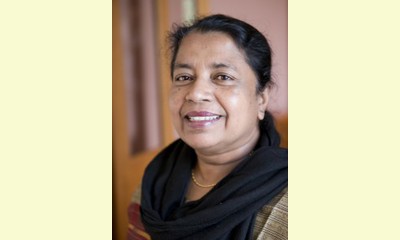|
|
16 Days of Activism: Meet Visaka Dharmadasa, Sri Lanka
un articulo por Nobel Women's Initiative
Video: Visaka Dharmadasa
Each year since 1991, tens of thousands of
activists from around the world have taken part in
the 16 Days of Activism Against Gender Violence
Campaign. The campaign’s central messages –
women’s rights are human rights and violence
against women constitutes a violation of human
rights – have been a rallying call of the women’s
movement. For these 16 days, Nobel Women’s
Initiative is spotlighting stories about women
activists around the globe.

Visaka Dharmadasa
click on photo to enlarge
Visaka Dharmadasa is the founder and chair of the
Association of War Affected Women (AWAW) and
Parents of Servicemen Missing in Action. Visaka
played a key role in ending the civil war and
fostering a lasting peace in post-conflict Sri
Lanka, and has emerged as one of the country’s
most powerful women leaders.
Beginning in her youth, Visaka spoke out against
the injustices around her. As an adult, when war
broke out across the country, she began working
together with other community members to
understand the affects of war on women. In 1998,
Visaka’s commitment to end the civil war deepened.
Her son, a military officer, was reported missing
in action. The war had come to her doorstep, and
she knew there was no turning back.
In 2000, Visaka established Parents of Servicemen
Missing in Action, an organization dedicated to
educating soldiers, youth and community leaders
about the international standards of conduct in
war and the importance of wearing ID tags during
combat. Visaka also began to bring women together
across divides in the pursuit of peace. Since its
inauguration, AWAW has brought together over 2000
women in Sri Lanka impacted by the war.
Visaka has initiated and been included in numerous
peace dialogues with senior government officials.
She designed and facilitated the Track II dialogue
processes within Sri Lanka, effectively bringing
together influential civil society leaders to
discuss peace. Visaka is also credited for
bringing the Liberation Tigers of Tamil Eelam to
the peace table. Their participation in peace
talks eventually led to the brokering of a
ceasefire. Visaka was also heavily involved in
introducing a National Action Plan on UN
resolution 1325 on women, peace and security to
Sri Lanka.
In recognition of her work for peace, Visaka was
nominated for a collective Nobel Peace Prize in
2005 as part of the 1000 Peace Women Across the
Globe and was awarded the prestigious Humanitarian
Award in 2006 by Inter Action of Washington. She
is a member of the South Asia Small Arms network,
Women Waging Peace, and sits on the global
advisory council of Women Thrive World Wide.
[Note: Thank you to Janet Hudgins, the CPNN reporter
for this article.]
|








|
DISCUSSION
Pregunta(s) relacionada(s) al artículo :
Where in the world can we find good leadership today?,
* * * * *
Comentario más reciente:
:
Once again, as they have done now each year since 2009, the Nobel Women's Initiative provides biographies of 16 women leaders involved in local action for peace and justice around the world, and in particular to stop violence against women. Last year's biographies were listed in the CPNN discussionboard.

|
|









